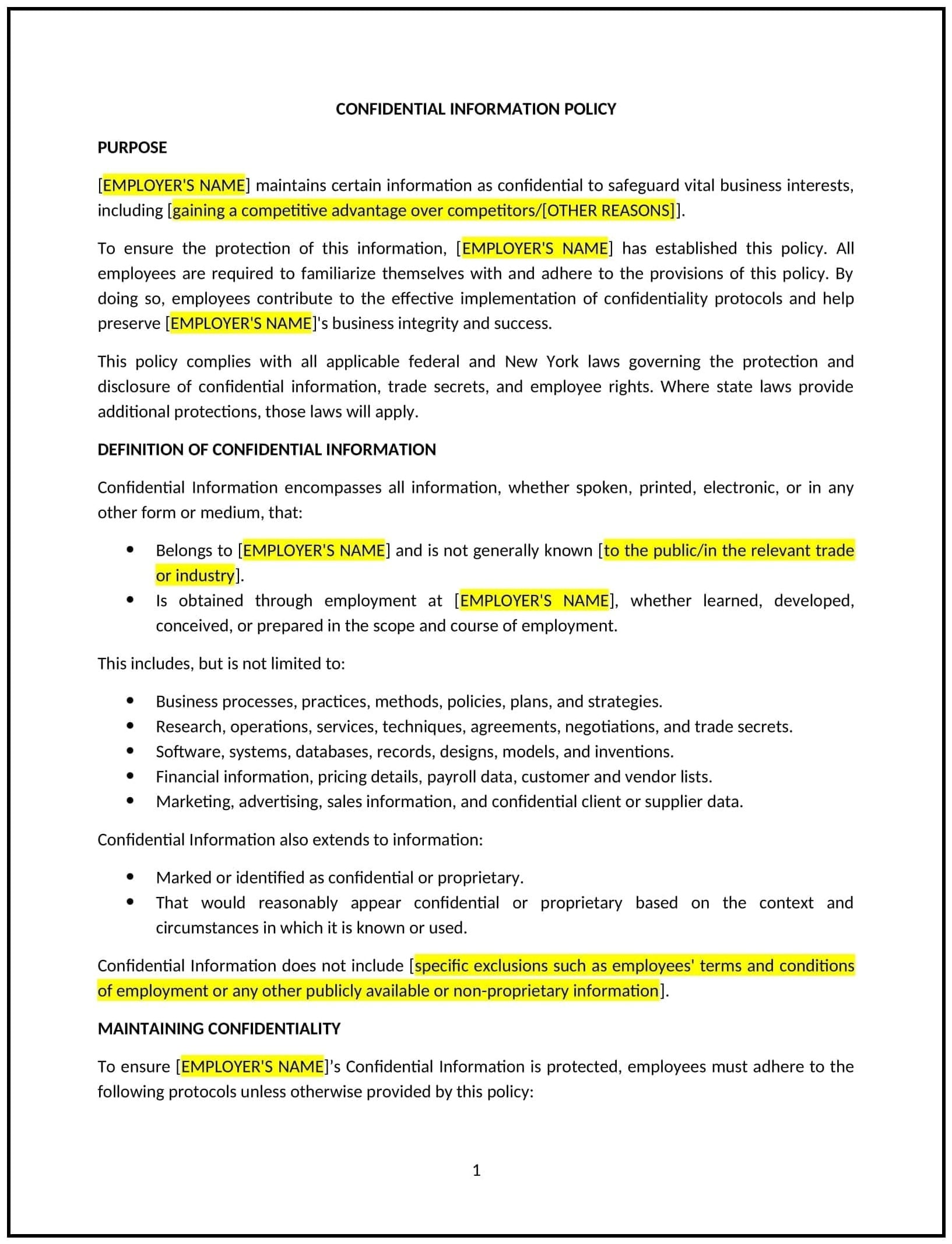Confidential information policy (New York): Free template
Got contracts to review? While you're here for policies, let Cobrief make contract review effortless—start your free review now.

Customize this template for free
Confidential information policy (New York)
A confidential information policy helps New York businesses protect sensitive information from unauthorized disclosure, misuse, or loss. This policy defines what constitutes confidential information, outlines how it should be handled, and establishes the procedures for maintaining its security. It also sets guidelines for employees and contractors regarding the protection of intellectual property, trade secrets, client data, financial information, and any other proprietary details. The policy aims to safeguard the integrity and confidentiality of business operations, comply with legal requirements, and mitigate risks related to data breaches or unauthorized access.
By implementing this policy, businesses can reduce the risk of confidential information leaks, enhance trust with clients and partners, and ensure compliance with applicable data protection laws.
How to use this confidential information policy (New York)
- Define confidential information: Clearly specify what types of information are considered confidential, including trade secrets, financial data, intellectual property, client information, and any proprietary business strategies. The policy should explain how confidential information is categorized.
- Establish guidelines for handling confidential information: Provide instructions on how to securely store, share, and transmit confidential information. This includes guidelines for physical security, electronic data protection, and secure communication practices.
- Require confidentiality agreements: Ensure that all employees, contractors, and third parties handling confidential information sign confidentiality agreements to acknowledge their responsibility in protecting sensitive data.
- Limit access to confidential information: Define who within the organization has access to confidential information, and ensure that access is granted only to those who need it to perform their job duties. The policy should establish guidelines for granting and revoking access.
- Train employees: Conduct regular training sessions to educate employees on the importance of confidentiality, how to recognize confidential information, and the procedures for handling it securely.
- Address data breaches: Outline the steps to take in the event of a data breach or unauthorized disclosure of confidential information, including immediate reporting, investigation, and corrective actions.
- Comply with New York laws: Ensure that the policy complies with New York state laws and federal regulations governing data protection, privacy, and confidentiality, such as the New York SHIELD Act or applicable provisions of the GDPR.
Benefits of using this confidential information policy (New York)
This policy offers several benefits for New York businesses:
- Protects sensitive data: By establishing clear guidelines for handling confidential information, the policy helps prevent unauthorized access, data breaches, and theft of proprietary business information.
- Reduces legal risks: The policy helps businesses comply with state and federal regulations related to data protection and confidentiality, reducing the risk of fines, lawsuits, or reputational harm.
- Enhances trust with clients and partners: A business that demonstrates a strong commitment to confidentiality builds trust with clients, customers, and business partners, ensuring positive relationships and ongoing collaborations.
- Promotes a culture of responsibility: The policy ensures that all employees are aware of their responsibilities in protecting confidential information, fostering a culture of accountability and diligence.
- Supports business continuity: By preventing leaks or breaches of confidential data, the policy helps maintain the integrity of the business’s operations and minimizes potential disruptions caused by security incidents.
Tips for using this confidential information policy (New York)
- Communicate the policy clearly: Ensure that all employees, contractors, and third parties are aware of the policy and understand their responsibilities for protecting confidential information. This can be done during onboarding, through employee handbooks, and in regular training sessions.
- Implement secure practices: Ensure that all employees follow best practices for securing confidential information, such as using strong passwords, encrypting sensitive data, and securing physical documents.
- Limit access to sensitive information: Restrict access to confidential data on a need-to-know basis. Ensure that access is controlled, monitored, and revoked when no longer necessary for job functions.
- Enforce confidentiality agreements: Require employees and contractors to sign confidentiality agreements to ensure they understand and commit to maintaining confidentiality during and after their employment or engagement.
- Respond promptly to breaches: In the event of a breach, act quickly to investigate the cause, mitigate damage, and take corrective actions to prevent further exposure. The policy should include a step-by-step process for handling breaches.
- Regularly review the policy: Periodically review and update the confidential information policy to ensure it remains aligned with business practices, changes in regulations, and any emerging risks related to data protection.